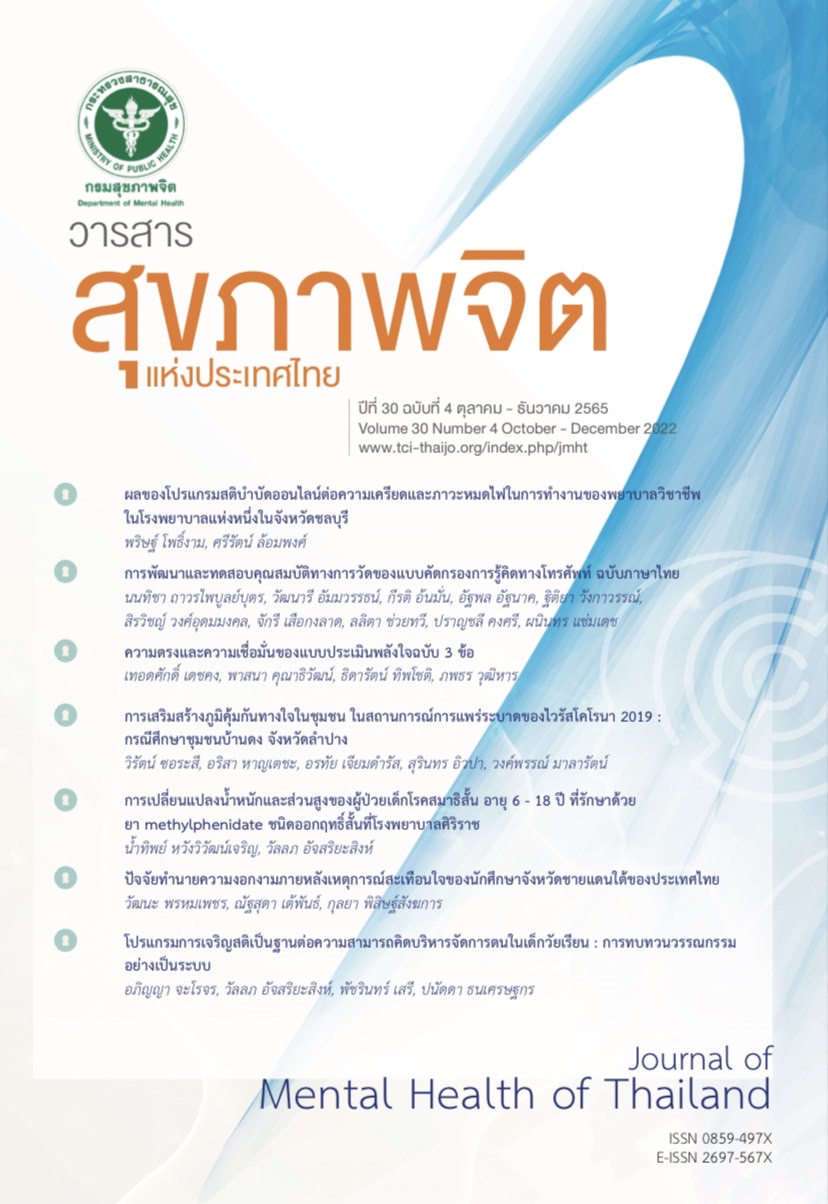โปรแกรมการเจริญสติเป็นฐานต่อความสามารถคิดบริหารจัดการตนในเด็กวัยเรียน : การทบทวนวรรณกรรมอย่างเป็นระบบ
คำสำคัญ:
การเจริญสติ, ความสามารถคิดบริหารจัดการตน, เด็กวัยเรียนบทคัดย่อ
วัตถุประสงค์ : เพื่อทบทวนลักษณะและผลของโปรแกรมการเจริญสติเป็นฐานต่อความสามารถคิดบริหารจัดการตนในเด็กวัยเรียน
วิธีการ : สืบค้นงานวิจัยเชิงทดลองแบบสุ่มชนิดมีกลุ่มควบคุมจากฐานข้อมูล PubMed, EMBASE และ ThaiJO ตั้งแต่ปี ค.ศ. 1989 ถึง ค.ศ. 2021 กำหนดคำสำคัญในการค้นหาจากกรอบแนวคิด PICO ได้แก่ child, children, school-age, student, mindfulness, mindfulness intervention, และ executive function(s) ตรวจสอบคุณภาพงานวิจัยด้วยเครื่องมือ revised Cochrane risk-of-bias tool for randomized trials (RoB 2) วิเคราะห์ข้อมูลโดยใช้สถิติเชิงพรรณนา ได้แก่ ความถี่ ร้อยละ และค่าเฉลี่ย
ผล : งานวิจัยที่สืบค้นได้ 2,799 เรื่อง ผ่านเกณฑ์คัดเลือก 10 เรื่อง การประเมินคุณภาพงานวิจัยพบว่ามีอคติสูง 2 เรื่อง ต้องพิจารณา 4 เรื่อง และมีอคติต่ำ 4 เรื่อง งานวิจัยส่วนใหญ่มีการนำหลักการฝึกสติตามแนวทาง mindfulness-based stress reduction (MBSR) มาใช้ในการพัฒนาโปรแกรม (ร้อยละ 60) ใช้เวลาทดลอง 8 สัปดาห์ (ร้อยละ 60) และมีความถี่ 1 ครั้งต่อสัปดาห์ (ร้อยละ 70) มีการวัดผลลัพธ์ซึ่งเป็นองค์ประกอบของความสามารถคิดบริหารจัดการตน 6 ด้าน ได้แก่ 1) สมาธิ 2) ความจำขณะทำงาน 3) การลดลงของปัญหาเชิงพฤติกรรม สมาธิ หรืออาการทางคลินิก 4) การควบคุมตนเอง 5) สติ และ 6) ความสามารถคิดบริหารจัดการตน ในภาพรวมโปรแกรมการเจริญสติเป็นฐานมีผลต่อการพัฒนาความสามารถคิดบริหารจัดการตนในเกือบทุกองค์ประกอบ ยกเว้นด้านสติ
สรุป : โปรแกรมการเจริญสติเป็นฐานมีผลพัฒนาความสามารถคิดบริหารจัดการตนส่วนใหญ่ของเด็กวัยเรียน
Downloads
เอกสารอ้างอิง
สำนักงานเลขาธิการสภาการศึกษา. แผนการศึกษาแห่งชาติ พ.ศ. 2560 - 2579 [National education plan 2017 - 2036]. กรุงเทพฯ: สำนักงานเลขาธิการสภาการศึกษา; 2560. น. 226.
ฐาปณีย์ แสงสว่าง, วิไลลักษณ์ ลังกา, ดารณี อุทัยรัตนกิจ, สุวพร เซ็มเฮง. การพัฒนาตัวบ่งชี้ทักษะการบริหารการรู้คิด อารมณ์ และพฤติกรรม สำหรับนักเรียนชั้นประถมศึกษา [A development of executive function skills indicators for elementary students]. วารสาร BU Academic Review. 2559;15(1):14-28.
Diamond A. Activities and programs that improve children’s executive functions. Curr Dir Psychol Sci. 2012;21(5):335-41. doi:10.1177/0963721412453722.
Borella E, Carretti B, Pelegrina S. The specific role of inhibition in reading comprehension in good and poor comprehenders. J Learn Disabil. 2010;43(6):541-52. doi:10.1177/0022219410371676.
Duncan G, Dowsett C, Claessens A, Magnuson K, Huston A, Klebanov P, et al. School readiness and later achievement. Dev Psychol. 2007;43(6):1428-46. doi:10.1037/0012-1649.43.6.1428.
Gathercole S, Pickering S, Ambridge B, Wearing H. The structure of working memory from 4 to 15 years of age. Dev Psychol. 2004;40(2):177-90. doi:10.1037/0012-1649.40.2.177.
สํานักงานส่งเสริมสวัสดิภาพและพิทักษ์เด็ก เยาวชน ผู้ด้อยโอกาส และผู้สูงอายุ กระทรวงการพัฒนาสังคมและความมั่นคงของมนุษย์ ร่วมกับสถาบันวิจัยเพื่อการพัฒนาประเทศไทย. รายงานการพัฒนาเด็กและเยาวชน ประจำปี 2553 [Child and youth development report 2010]. กรุงเทพฯ: สํานัก; 2555.
Bauer CCC, Rozenkrantz L, Caballero C, Nieto-Castanon A, Scherer E, West MR, et al. Mindfulness training preserves sustained attention and resting state anticorrelation between default-mode network and dorsolateral prefrontal cortex: a randomized controlled trial. Hum Brain Mapp. 2020;41(18):5356-69. doi:10.1002/hbm.25197.
Britton WB, Lepp NE, Niles HF, Rocha T, Fisher NE, Gold JS. A randomized controlled pilot trial of classroom-based mindfulness meditation compared to an active control condition in sixth-grade children. J Sch Psychol. 2014;52(3):263-78. doi:10.1016/j.jsp.2014.03.002.
Felver JC, Tipsord JM, Morris MJ, Racer KH, Dishion TJ. The effects of mindfulness-based intervention on children's attention regulation. J Atten Disord. 2017;21(10):872-81. doi:10.1177/1087054714548032.
Guenther CH, Stephens RL, Ratliff ML, Short SJ. Parent-child mindfulness-based training: a feasibility and acceptability study. J Evid Based Integr Med. 2021;26:2515690X211002145. doi:10.1177/2515690X211002145.
Huguet A, Izaguirre Eguren J, Miguel-Ruiz D, Vall Vallés X, Alda JA. Deficient emotional self-regulation in children with attention deficit hyperactivity disorder: mindfulness as a useful treatment modality. J Dev Behav Pediatr. 2019;40(6):425-31. doi:10.1097/DBP.0000000000000682.
Lawler JM, Esposito EA, Doyle CM, Gunnar MR. A preliminary, randomized-controlled trial of mindfulness and game-based executive function trainings to promote self-regulation in internationally-adopted children. Dev Psychopathol. 2019;31(4):1513-25. doi:10.1017/S0954579418001190.
Muratori P, Conversano C, Levantini V, Masi G, Milone A, Villani S, et al. Exploring the efficacy of a mindfulness program for boys with attention-deficit hyperactivity disorder and oppositional defiant disorder. J Atten Disord. 2021;25(11):1544-53. doi:10.1177/1087054720915256.
Schonert-Reichl KA, Oberle E, Lawlor MS, Abbott D, Thomson K, Oberlander TF, et al. Enhancing cognitive and social-emotional development through a simple-to-administer mindfulness-based school program for elementary school children: a randomized controlled trial. Dev Psychol. 2015;51(1):52-66. doi:10.1037/a0038454.
Crescentini C, Capurso V, Furlan S, Fabbro F. Mindfulness-oriented meditation for primary school children: effects on attention and psychological well-being. Front Psychol. 2016;7:805. doi:10.3389/fpsyg.2016.00805.
White LS. Reducing stress in school-age girls through mindful yoga. J Pediatr Health Care. 2012;26(1):45-56. doi:10.1016/j.pedhc.2011.01.002.
วิภาวี เผ่ากันทรากร, นภา จิรัฐจินตนา. ผลของโปรแกรมสติบำบัดต่อภาวะซึมเศร้าและคุณภาพชีวิตของผู้ป่วยโรคซึมเศร้า [Mindfulness-Based Program for depression]. วารสารสุขภาพจิตแห่งประเทศไทย. 2564;29(4):286-96.
Anantavorawong S, Narkpongphun A. The effects of a mindfulness therapy program on core symptoms of children with ADHD disorder. International Journal of Child Development and Mental Health. 2018;6(2):40-55.
พชรพล กิจภิญโญชัย, สุพร อภินันทเวช, วัลลภ อัจสริยะสิงห์. การศึกษานำร่องผลของกลุ่มบำบัดแบบเจริญสติ ต่อกระบวนการคิดขั้นสูงในนักเรียนชั้นประถมศึกษา [Pilot study of effect of mindfulness-based cognitive group therapy for improving executive function in elementary school children]. วารสารสมาคมจิตแพทย์แห่งประเทศไทย. 2563;65(1):3-14.
Mak C, Whittingham K, Cunnington R, Boyd R. Efficacy of mindfulness-based interventions for attention and executive function in children and adolescents—a systematic review. Mindfulness. 2018;9(1):59-78. doi:10.1007/s12671-017-0770-6.
Meltzer L. Executive function in education: From theory to practice. Meltzer L, editor. New York: Guilford Press; 2007. p. xvi, 320-xvi.
Higgins JPT, Thomas J, Chandler J, Cumpston M, Li T, Page MJ, et al. Assessing risk of bias in a randomized trial [Internet]. London: Cochrane Training;[cited 2022 Nov 1]. Available from: https://training.cochrane.org/handbook/current/chapter-08
Kabat-Zinn J. Mindfulness meditation in everyday life In: Kabat-Zinn J, editor. Wherever you go, there you are. New York: Hyperion; 1994.
Slattery EJ, O'Callaghan E, Ryan P, Fortune DG, McAvinue LP. Popular interventions to enhance sustained attention in children and adolescents: a critical systematic review. Neurosci Biobehav Rev. 2022;137:104633. doi:10.1016/j.neubiorev.2022.104633.
ดาวน์โหลด
เผยแพร่แล้ว
รูปแบบการอ้างอิง
ฉบับ
ประเภทบทความ
สัญญาอนุญาต
ลิขสิทธิ์ (c) 2022 วารสารสุขภาพจิตแห่งประเทศไทย

อนุญาตภายใต้เงื่อนไข Creative Commons Attribution-NonCommercial-NoDerivatives 4.0 International License.
- ผู้อ่านสามารถนำข้อความ ข้อมูล จากวารสารไปใช้ไปใช้ประโยชน์ทางวิชาการได้ เช่น เพื่อการสอน เพื่อการอ้างอิง แต่การนำไปใช้เพื่อวัตถุประสงค์อื่น เช่น เพื่อการค้า จะต้องได้รับอนุญาตเป็นลายลักษณ์อักษรจากกรมสุขภาพจิตก่อน
- ความคิดเห็น ข้อมูล และบทสรุปต่าง ๆ ที่ลงตีพิมพ์ในวารสารสุขภาพจิตแห่งประเทศไทยเป็นของผู้เขียนบทความและมิได้แสดงว่ากองบรรณาธิการหรือกรมสุขภาพจิตเห็นพ้องด้วย




